初三英语语法总复习教(学)案
- 格式:docx
- 大小:133.64 KB
- 文档页数:70
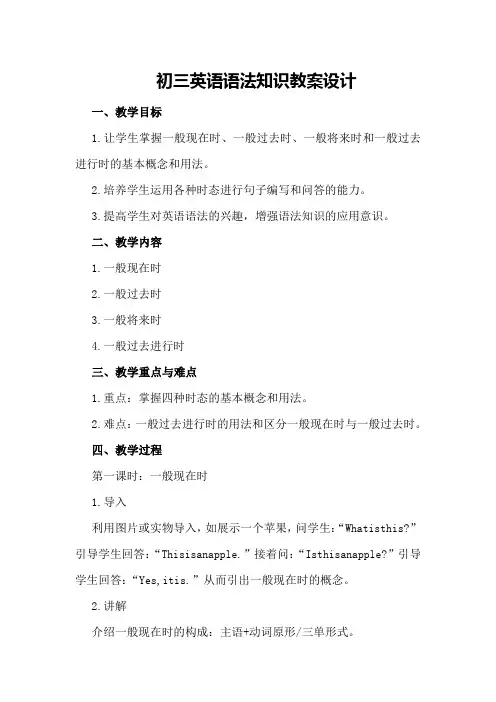
初三英语语法知识教案设计一、教学目标1.让学生掌握一般现在时、一般过去时、一般将来时和一般过去进行时的基本概念和用法。
2.培养学生运用各种时态进行句子编写和问答的能力。
3.提高学生对英语语法的兴趣,增强语法知识的应用意识。
二、教学内容1.一般现在时2.一般过去时3.一般将来时4.一般过去进行时三、教学重点与难点1.重点:掌握四种时态的基本概念和用法。
2.难点:一般过去进行时的用法和区分一般现在时与一般过去时。
四、教学过程第一课时:一般现在时1.导入利用图片或实物导入,如展示一个苹果,问学生:“Whatisthis?”引导学生回答:“Thisisanapple.”接着问:“Isthisanapple?”引导学生回答:“Yes,itis.”从而引出一般现在时的概念。
2.讲解介绍一般现在时的构成:主语+动词原形/三单形式。
通过例句展示一般现在时的用法,如:“Igotoschoolbuseveryday.”“Heplaysfootballonweekends.”3.练习让学生用一般现在时编写句子,如:“Ilikeapples.”“Shehasacat.”分组进行问答练习,如:“Doyoulikebananas?”“Yes,Ido./No,Idon't.”4.小结第二课时:一般过去时1.导入利用图片或故事导入,如讲述一个关于昨天发生的故事,引导学生用一般过去时描述故事中的动作。
2.讲解介绍一般过去时的构成:主语+动词过去式。
通过例句展示一般过去时的用法,如:“Ivisitedmygrandparentsyesterday.”“Shewatchedamovielastnight.”3.练习让学生用一般过去时编写句子,如:“IvisitedtheGreatWalllastweek.”“Heplayedbasketballyesterday.”分组进行问答练习,如:“Didyougototheparkyesterday?”“Yes,Idid./No,Ididn't.”4.小结第三课时:一般将来时1.导入利用图片或情境导入,如展示一幅未来的图片,引导学生用一般将来时描述未来的计划。
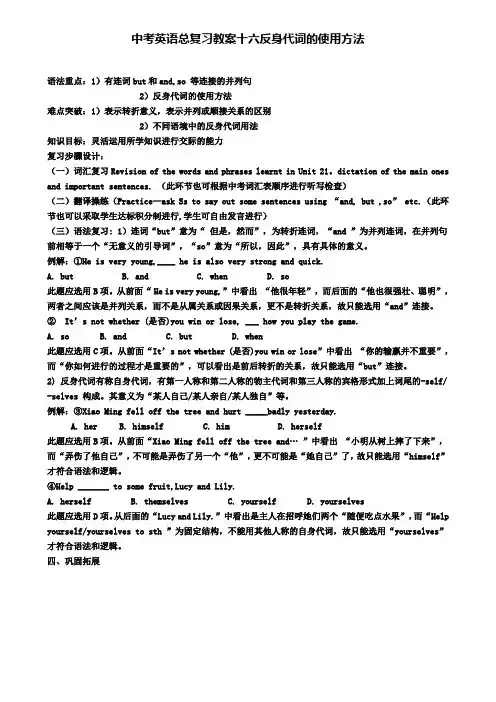
中考英语总复习教案十六反身代词的使用方法语法重点:1)有连词but和and,so 等连接的并列句2)反身代词的使用方法难点突破:1)表示转折意义,表示并列或顺接关系的区别2)不同语境中的反身代词用法知识目标:灵活运用所学知识进行交际的能力复习步骤设计:(一)词汇复习Revision of the words and phrases learnt in Unit 21。
dictation of the main ones and important sentences. (此环节也可根据中考词汇表顺序进行听写检查)(二)翻译操练(Practice—ask Ss to say out some sentences using “and, but ,so” etc.(此环节也可以采取学生达标积分制进行,学生可自由发言进行)(三)语法复习: 1)连词“but”意为“ 但是,然而”,为转折连词,“and ”为并列连词,在并列句前相等于一个“无意义的引导词”,“so”意为“所以,因此”,具有具体的意义。
例解:①He is very young,____ h e is also very strong and quick.A. butB. andC. whenD. so此题应选用B项。
从前面“ He is very young,”中看出“他很年轻”,而后面的“他也很强壮、聪明”,两者之间应该是并列关系,而不是从属关系或因果关系,更不是转折关系,故只能选用“and”连接。
②It’s not whether (是否)you win or lose, ___ how you play the game.A. soB. andC. butD. when此题应选用C项。
从前面“It’s not whether (是否)you win or lose”中看出“你的输赢并不重要”,而“你如何进行的过程才是重要的”,可以看出是前后转折的关系,故只能选用“but”连接。
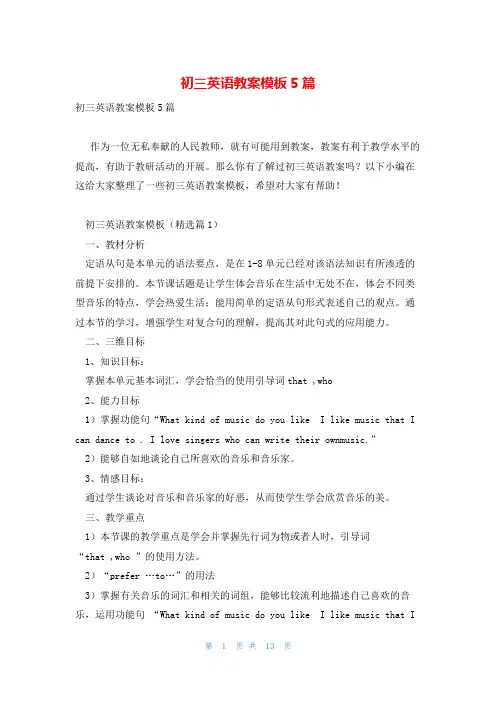
初三英语教案模板5篇初三英语教案模板5篇作为一位无私奉献的人民教师,就有可能用到教案,教案有利于教学水平的提高,有助于教研活动的开展。
那么你有了解过初三英语教案吗?以下小编在这给大家整理了一些初三英语教案模板,希望对大家有帮助!初三英语教案模板(精选篇1)一、教材分析定语从句是本单元的语法要点,是在1-8单元已经对该语法知识有所渗透的前提下安排的。
本节课话题是让学生体会音乐在生活中无处不在,体会不同类型音乐的特点,学会热爱生活;能用简单的定语从句形式表述自己的观点。
通过本节的学习,增强学生对复合句的理解,提高其对此句式的应用能力。
二、三维目标1、知识目标:掌握本单元基本词汇,学会恰当的使用引导词that ,who2、能力目标1)掌握功能句“What kind of music do you like I like music that I can dance to . I love singers who can write their ownmusic.”2)能够自如地谈论自己所喜欢的音乐和音乐家。
3、情感目标:通过学生谈论对音乐和音乐家的好恶,从而使学生学会欣赏音乐的美。
三、教学重点1)本节课的教学重点是学会并掌握先行词为物或者人时,引导词“that ,who ”的使用方法。
2)“prefer …to…”的用法3)掌握有关音乐的词汇和相关的词组,能够比较流利地描述自己喜欢的音乐,运用功能句“What kind of music do you like I like music that Ican dance to . I love singers who can write their own music.”四、教学难点定语从句运用五、教学策略采用任务型语言教学,实施情境教学法、小组合作探究法、情感激励法。
六、教学准备自制多媒体课件(PowerPoint);录音机(A tape recorder)七、教学环节1、课堂导入⑴ Warming up⑵ Discuss: Do you like music What kind ofmusic do you know⑶ There aremany kinds of music such as pop ,jazz, rock……. Let Sstalk about the kinds of music..(多媒体出示)⑷Let Ss read 1a. Explain the sentences:I prefermusic that has great lyrics=I like music that has great lyrics better.lyrics:the plural form is often used.Ask Ss topractice in pairs then make up a short passage using the four sentences on thescreen.2、课堂讲授Explain attributive clauses.定语从句:在复合句中修饰名词或者代词的从句叫做定语从句。
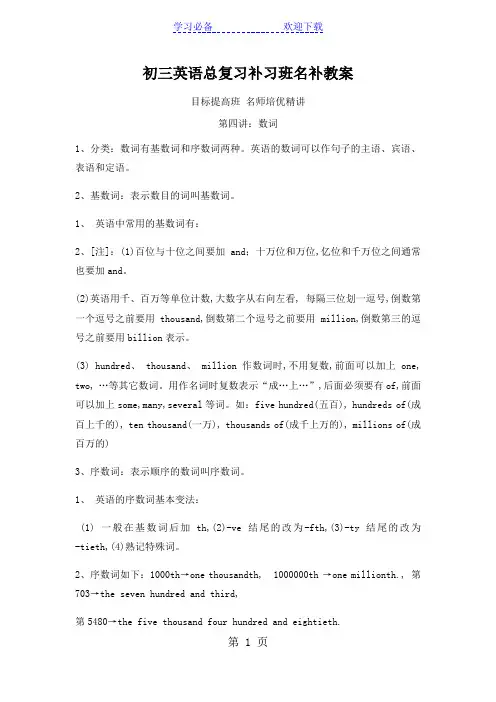
初三英语总复习补习班名补教案目标提高班名师培优精讲第四讲:数词1、分类:数词有基数词和序数词两种。
英语的数词可以作句子的主语、宾语、表语和定语。
2、基数词:表示数目的词叫基数词。
1、英语中常用的基数词有:2、[注]:(1)百位与十位之间要加and;十万位和万位,亿位和千万位之间通常也要加and。
(2)英语用千、百万等单位计数,大数字从右向左看, 每隔三位划一逗号,倒数第一个逗号之前要用thousand,倒数第二个逗号之前要用million,倒数第三的逗号之前要用billion表示。
(3) hundred、 thousand、 million作数词时,不用复数,前面可以加上one, two, …等其它数词。
用作名词时复数表示“成…上…”,后面必须要有of,前面可以加上some,many,several等词。
如:five hundred(五百), hundreds of(成百上千的), ten thousand(一万), thousands of(成千上万的), millions of(成百万的)3、序数词:表示顺序的数词叫序数词。
1、英语的序数词基本变法:(1) 一般在基数词后加th,(2)-ve结尾的改为-fth,(3)-ty结尾的改为-tieth,(4)熟记特殊词。
2、序数词如下:1000th→one thousandth, 1000000th →one millionth., 第703→the seven hundred and third,第5480→the five thousand four hundred and eightieth.3、注:(1)两位以上的序数词仅个位数部分用序数词,其余部分仍用基数词。
如:thirty-sixth,(2) 使用序数词时一般加定冠词the. 如:I’m in the third grade.(3) 序数词作“几分之几”讲时,有复数形式。
其中分子用基数词,分母用序数词,若分子大于一,则分母给复数,如:1/5→one fifth ; 2/3→ two thirds ; 4/7→ four sevenths ; 1/2→ a half ; 1/4→a quarter ; 3/4→ three quarters ; 50%→ fifty hundredths ( fifty per cent).4、数词的用法:1、表示年份:2019: twenty thousand and two ; 1976 : nineteen seventy-six.2、表示日期: 12月1日: Dec.1st或the first of December;2019年11月8日: Nov. 8th, 2019.3、表示时刻: 5:15→ five fifteen或a quarter past five ; 8:30→ eight thirty或half past eight ; 10:45→ ten forty-five或a quarter to eleven.4、表示编号:Room 105→Room one 0 five; Bus No.13→Bus Number Thirteen; P.5→Page Five; Tel.No.7658659→Telephone Number seven-six-five-eight-six-five-nine5、小数的读法:5.7→ five point seven, 0.16 →zero point one six.6、“半”的表达:1/2→half, 半小时→half an hour, 1.5小时→one and a half hours或one hour and a half.7、序数词前面加the时,表示顺序,加a/an时表示“再一、又一”。
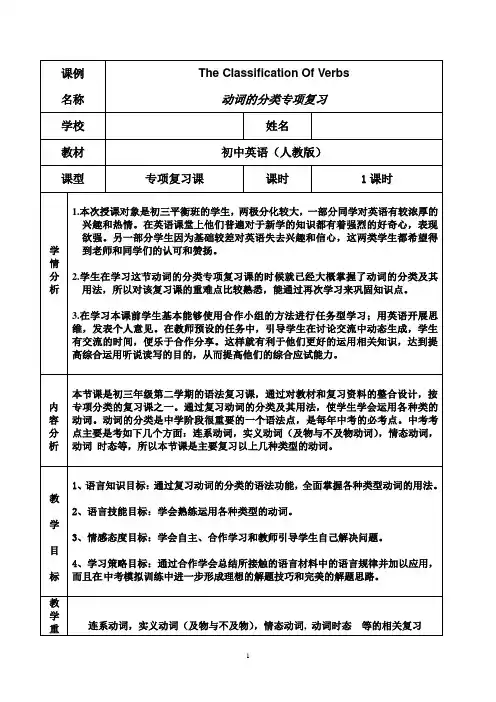
课例名称The Classification Of Verbs 动词的分类专项复习学校姓名教材初中英语(人教版)课型专项复习课课时1课时学情分析1.本次授课对象是初三平衡班的学生,两极分化较大,一部分同学对英语有较浓厚的兴趣和热情。
在英语课堂上他们普遍对于新学的知识都有着强烈的好奇心,表现欲强。
另一部分学生因为基础较差对英语失去兴趣和信心,这两类学生都希望得到老师和同学们的认可和赞扬。
2.学生在学习这节动词的分类专项复习课的时候就已经大概掌握了动词的分类及其用法,所以对该复习课的重难点比较熟悉,能通过再次学习来巩固知识点。
3.在学习本课前学生基本能够使用合作小组的方法进行任务型学习;用英语开展思维,发表个人意见。
在教师预设的任务中,引导学生在讨论交流中动态生成,学生有交流的时间,便乐于合作分享。
这样就有利于他们更好的运用相关知识,达到提高综合运用听说读写的目的,从而提高他们的综合应试能力。
内容分析本节课是初三年级第二学期的语法复习课,通过对教材和复习资料的整合设计,按专项分类的复习课之一。
通过复习动词的分类及其用法,使学生学会运用各种类的动词。
动词的分类是中学阶段很重要的一个语法点,是每年中考的必考点。
中考考点主要是考如下几个方面:连系动词,实义动词(及物与不及物动词),情态动词,动词时态等,所以本节课是主要复习以上几种类型的动词。
教学目标1、语言知识目标:通过复习动词的分类的语法功能,全面掌握各种类型动词的用法。
2、语言技能目标:学会熟练运用各种类型的动词。
3、情感态度目标:学会自主、合作学习和教师引导学生自己解决问题。
4、学习策略目标:通过合作学会总结所接触的语言材料中的语言规律并加以应用,而且在中考模拟训练中进一步形成理想的解题技巧和完美的解题思路。
教学重连系动词,实义动词(及物与不及物),情态动词, 动词时态等的相关复习The Classification Of Verbs动词的分类专项复习导学案一,学习目标:1、能够正确使用连系动词,实义动词(及物动词和不及物动词),情态动词等。
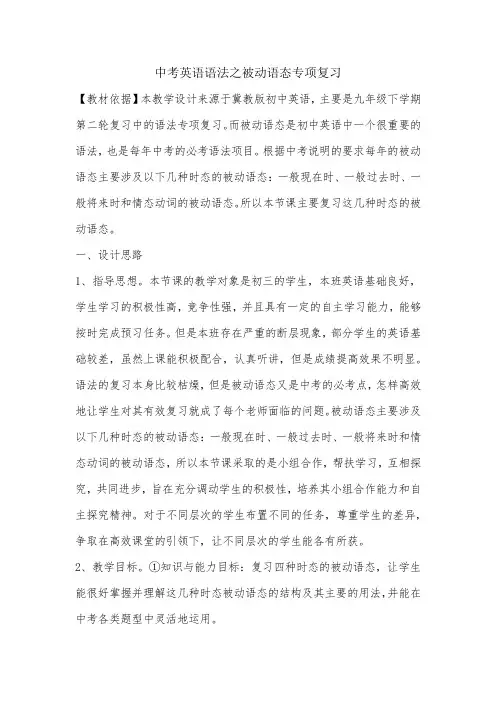
中考英语语法之被动语态专项复习【教材依据】本教学设计来源于冀教版初中英语,主要是九年级下学期第二轮复习中的语法专项复习。
而被动语态是初中英语中一个很重要的语法,也是每年中考的必考语法项目。
根据中考说明的要求每年的被动语态主要涉及以下几种时态的被动语态:一般现在时、一般过去时、一般将来时和情态动词的被动语态。
所以本节课主要复习这几种时态的被动语态。
一、设计思路1、指导思想。
本节课的教学对象是初三的学生,本班英语基础良好,学生学习的积极性高,竞争性强,并且具有一定的自主学习能力,能够按时完成预习任务。
但是本班存在严重的断层现象,部分学生的英语基础较差,虽然上课能积极配合,认真听讲,但是成绩提高效果不明显。
语法的复习本身比较枯燥,但是被动语态又是中考的必考点,怎样高效地让学生对其有效复习就成了每个老师面临的问题。
被动语态主要涉及以下几种时态的被动语态:一般现在时、一般过去时、一般将来时和情态动词的被动语态,所以本节课采取的是小组合作,帮扶学习,互相探究,共同进步,旨在充分调动学生的积极性,培养其小组合作能力和自主探究精神。
对于不同层次的学生布置不同的任务,尊重学生的差异,争取在高效课堂的引领下,让不同层次的学生能各有所获。
2、教学目标。
①知识与能力目标:复习四种时态的被动语态,让学生能很好掌握并理解这几种时态被动语态的结构及其主要的用法,并能在中考各类题型中灵活地运用。
②方法与途径:通过让学生预习所复习的语法,并在课堂上小组合作用思维导图展示成果的方式有效复习四种时态的被动语态。
尊重学生的差异,让各类学生都能学有所得,学有所获。
③情感与评价目标:在小组合作的过程中,注意观察并培养学生用思维导图的方式与学过的话题结合的能力,培养其归纳、合作意识,提高学习英语的兴趣。
④教学手段应用:运用ppt及音乐二、教学准备①提前布置预习任务,学生提前查阅相关的教材找出被动语态的相关知识以及需要注意的问题。
②有关被动语态的电影对话,音乐及ppt三、教学过程(Teaching Procedure)Step 1 Warming-up1. Listen to the music before class and Ss try to find the passive voice sentences in it.2. Look at the interesting dialogues in the movie and also find out the passive voice sentences.Step 2 Check their preview workT checks their preview work by asking some simple questions.Step 3 Group WorkFour of them are in groups and they try to design a mind map on passive voice of four different tenses. At the same time, they try their best to relatethe passive voice to he topic and summarize the correct usage of them. Step 4 Show Time①T will ask four groups to show their achievement in front of the whole class.②Ss will have a quick discussion on their work and choose the best one.③T will make a quick summary and supplement on their work and correct their mistakes.Step 5 Special using of the passive voiceSs still are in groups to discuss the special using of the passive voice and finish some relative exercise.Step 6 Challenge the high school entry examination exercise from 2010-2016.Step 7 Make SummaryT makes a summary of the important forms of “be done”in different tenses.Step 8 Write a CompositionWrite a short Composition on Great Change of Our Village and try to use passive voice.Step 9 HomeworkFinish the exercise on workbook.四、教学反思义务教育英语课程标准要求教师要“以人为本”,最大化地发挥学生的主动性,将主动权交给学生,努力培养学生的自主学习能力,提高课堂效率。
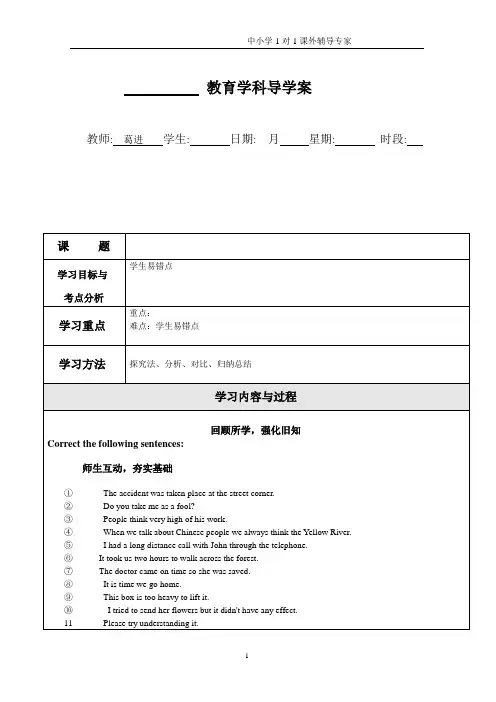
教育学科导学案教师:葛进学生:日期: 月星期:时段:课题学习目标与考点分析学生易错点学习重点重点:难点:学生易错点学习方法探究法、分析、对比、归纳总结学习内容与过程回顾所学,强化旧知Correct the following sentences:师生互动,夯实基础①The accident was taken place at the street corner.②Do you take me as a fool?③People think very high of his work.④When we talk about Chinese people we always think the Yellow River.⑤I had a long distance call with John through the telephone.⑥It took us two hours to walk across the forest.⑦The doctor came on time so she was saved.⑧It is time we go home.⑨This box is too heavy to lift it.⑩I tried to send her flowers but it didn't have any effect.11Please try understanding it.12The lake is two meters under sea level.13Under the help of our teacher, all of us passed the exam.14I think it is difficult to make myself to understand.15I am understanding the lesson now.16We walked until the edge of the forest.17Our school bus ca n hold until twenty children.18I waited for my mother to seven o'clock, but she didn't come.19Can you return this book until Monday?20We arrived home until it became dark.21He went to upstairs.22It is no us e to ask her.23I'll get used to treat the students this way.24I used to getting up early in th e morning.25Oil was used to cooking.26We used to go to the Great Wall three times.中考英语考前错题本very【误】 Thank you indeed.【正】 Thank you very much indeed.【析】 indeed用来修饰very much, 但要放其后面,而且也不要单独使用。
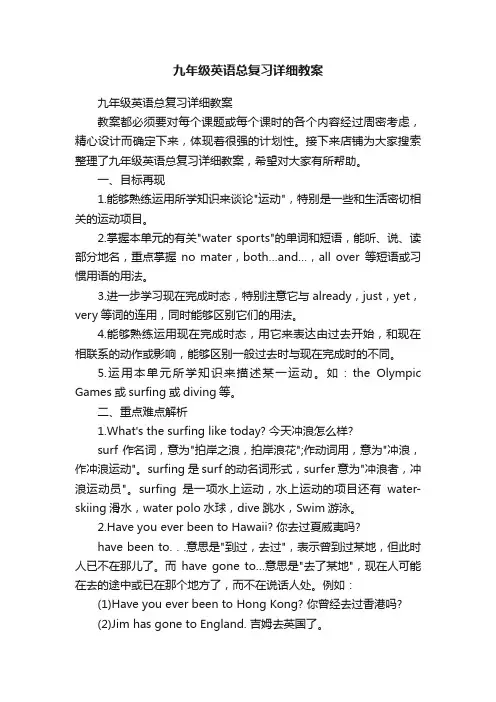
九年级英语总复习详细教案九年级英语总复习详细教案教案都必须要对每个课题或每个课时的各个内容经过周密考虑,精心设计而确定下来,体现着很强的计划性。
接下来店铺为大家搜索整理了九年级英语总复习详细教案,希望对大家有所帮助。
一、目标再现1.能够熟练运用所学知识来谈论"运动",特别是一些和生活密切相关的运动项目。
2.掌握本单元的有关"water sports"的单词和短语,能听、说、读部分地名,重点掌握no mater,both…and…,all over等短语或习惯用语的用法。
3.进一步学习现在完成时态,特别注意它与already,just,yet,very等词的连用,同时能够区别它们的用法。
4.能够熟练运用现在完成时态,用它来表达由过去开始,和现在相联系的动作或影响,能够区别一般过去时与现在完成时的不同。
5.运用本单元所学知识来描述某一运动。
如:the Olympic Games或surfing或diving等。
二、重点难点解析1.What's the surfing like today? 今天冲浪怎么样?surf作名词,意为"拍岸之浪,拍岸浪花";作动词用,意为"冲浪,作冲浪运动"。
surfing是surf的动名词形式,surfer意为"冲浪者,冲浪运动员"。
surfing是一项水上运动,水上运动的项目还有water-skiing滑水,water polo水球,dive跳水,Swim游泳。
2.Have you ever been to Hawaii? 你去过夏威夷吗?have been to. . .意思是"到过,去过",表示曾到过某地,但此时人已不在那儿了。
而have gone to…意思是"去了某地",现在人可能在去的途中或已在那个地方了,而不在说话人处。
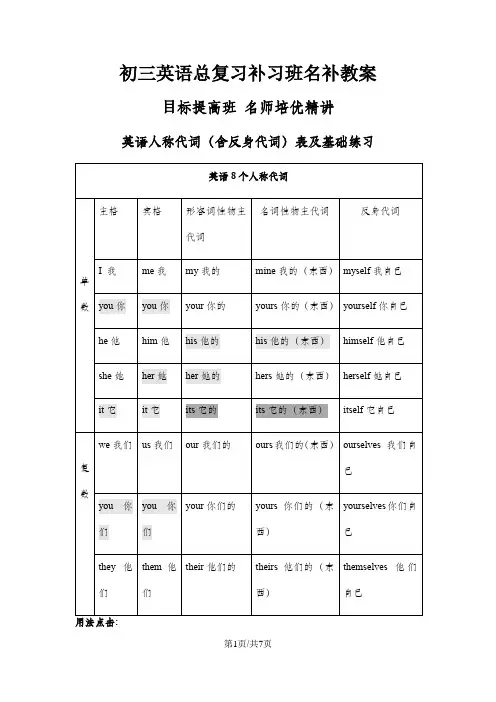
初三英语总复习补习班名补教案目标提高班名师培优精讲英语人称代词(含反身代词)表及基础练习1. 主格和宾格:I like you. You see him. They hit us. You teach them.主格宾格主格宾格主格宾格主格宾格2.◆形容词性物主代词其后必须跟名词||。
1)形容词性物主代词不能单独使用||,后面必接名词||,表示所有.如:•my pen我的钢笔your bag你的书包his bike他的自行车her desk她的书桌its name它的名字例句:Is that your bike? 那是你的自行车吗?Those are our books. 那些是我们的书||。
◆如果名词前有形容词性物主代词||,就不能同时用冠词(a||,an||,the)或指示代词(this||,that||,these||,those)修饰此名词||。
•[正]This is my pencil. [误]This is my a pencil.•[正]This is a pencil. [误] This is a my pencil.◆形容词性物主代词与形容词一起修饰名词时||,要放在形容词之前||。
如:his English books 他的英语书their Chinese friends 他们的中国朋友形容词性物主代词与名词性物主代词之间的关系为:例如:Your bedroom(=yours) is big.Mine (=My bedroom) is big||,too. 你的卧室大||。
我的卧室也大||。
注意:在使用名词性物主代词时||,必须有特定的语言环境||,也就是要省略的名词大家已经知道||,已经提起过||。
例:It’s hers. 是她的||。
(单独使用大家不知是怎么回事||,不可以这样用)There is a book. It’s hers. 那有本书||。
是她的||。
(先提及||,大家才明白)特别提醒:汉语表达常有省略“的”字的习惯||,如:我哥哥、你们老师||。
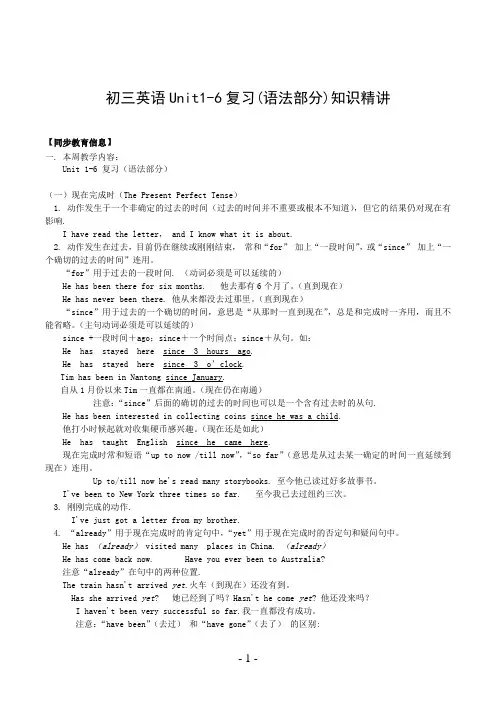
初三英语Unit1-6复习(语法部分)知识精讲【同步教育信息】一. 本周教学内容:Unit 1-6 复习(语法部分)(一)现在完成时(The Present Perfect Tense)1. 动作发生于一个非确定的过去的时间(过去的时间并不重要或根本不知道),但它的结果仍对现在有影响.I have read the letter, and I know what it is about.2. 动作发生在过去,目前仍在继续或刚刚结束,常和“for”加上“一段时间”,或“since”加上“一个确切的过去的时间”连用。
“for”用于过去的一段时间. (动词必须是可以延续的)He has been there for six months. 他去那有6个月了。
(直到现在)He has never been there. 他从来都没去过那里。
(直到现在)“since”用于过去的一个确切的时间,意思是“从那时一直到现在”,总是和完成时一齐用,而且不能省略。
(主句动词必须是可以延续的)since +一段时间+ago;since+一个时间点;since+从句。
如:He has stayed here since 3 hours ago.He has stayed here since 3 o’clock.Tim has been in Nantong since January.自从1月份以来Tim一直都在南通。
(现在仍在南通)注意:“since”后面的确切的过去的时间也可以是一个含有过去时的从句.He has been interested in collecting coins since he was a child.他打小时候起就对收集硬币感兴趣。
(现在还是如此)He has taught English since he came here.现在完成时常和短语“up to now /till now”,“so far”(意思是从过去某一确定的时间一直延续到现在)连用。
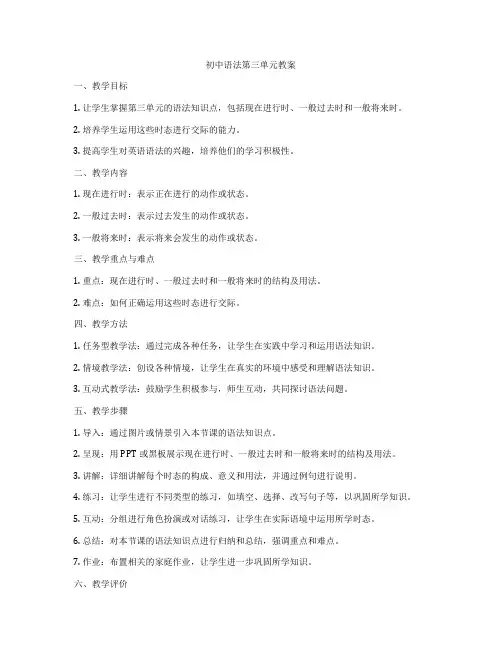
初中语法第三单元教案一、教学目标1. 让学生掌握第三单元的语法知识点,包括现在进行时、一般过去时和一般将来时。
2. 培养学生运用这些时态进行交际的能力。
3. 提高学生对英语语法的兴趣,培养他们的学习积极性。
二、教学内容1. 现在进行时:表示正在进行的动作或状态。
2. 一般过去时:表示过去发生的动作或状态。
3. 一般将来时:表示将来会发生的动作或状态。
三、教学重点与难点1. 重点:现在进行时、一般过去时和一般将来时的结构及用法。
2. 难点:如何正确运用这些时态进行交际。
四、教学方法1. 任务型教学法:通过完成各种任务,让学生在实践中学习和运用语法知识。
2. 情境教学法:创设各种情境,让学生在真实的环境中感受和理解语法知识。
3. 互动式教学法:鼓励学生积极参与,师生互动,共同探讨语法问题。
五、教学步骤1. 导入:通过图片或情景引入本节课的语法知识点。
2. 呈现:用PPT或黑板展示现在进行时、一般过去时和一般将来时的结构及用法。
3. 讲解:详细讲解每个时态的构成、意义和用法,并通过例句进行说明。
4. 练习:让学生进行不同类型的练习,如填空、选择、改写句子等,以巩固所学知识。
5. 互动:分组进行角色扮演或对话练习,让学生在实际语境中运用所学时态。
6. 总结:对本节课的语法知识点进行归纳和总结,强调重点和难点。
7. 作业:布置相关的家庭作业,让学生进一步巩固所学知识。
六、教学评价1. 课堂参与度:观察学生在课堂上的积极性、主动性和合作精神。
2. 练习正确率:检查学生练习题的正确率,了解他们对语法知识的掌握程度。
3. 交际运用:评估学生在角色扮演或对话中的语法运用情况,鼓励创新和灵活运用。
通过以上教学设计,希望能够帮助学生更好地掌握第三单元的语法知识点,提高他们的英语水平。
同时,注重培养学生的学习兴趣和积极性,使他们能够在愉快的氛围中学习英语。
初三语法专项——被动语态复习教学设计Learning ObjectivesI. Knowledge Objectives•掌握三种时态的被动语态结构;•掌握被动语态的重难点内容(注意事项);II. Ability Objectives•拓展阅读:通过英文分级绘本阅读,强化语法复习;•锻炼中考试题解题能力。
III. Emotion and Attitude Objectives•同学们能够通过小组合作的方式达到互相帮助、共同进步的学习氛围;•通过绘本学习,让同学们对西方文化有更多的兴趣以及更多的了解。
IV. Learning Strategies•同学们能够熟悉被动语态解题技巧以及中考试题解题技巧Important and difficult pointsI. Important point•能够熟悉被动语态的基本时态结构及重难点内容II. Difficult point•能够在具体的语篇当中正确分析被动语态的用法Learning ProcedureSteps Aims Teacher’s activities Students’ activities TimeI. Warming- up To form a relaxingclass mode and getclosed to students.Greet students. Greet the teacher. 2minsII. Leading- in Lead in the topic. ①Show the objectives of thelesson.②Play a part of the cartoonJourney to the West.Watch the cartooncarefully and answer thequestions.5minsIII. Guided- learning. &Task 1: Group work ①Test students’ability: Studentsare able to figureout the mistakes inthe passage.②Review the basicrules of the PassiveVoice: Studentscan analyze andremember the rulesof Passive V oice.①Show the students a passageabout this part of cartoon;②Guide students to find out themistakes in the passage and correctthe mistake one by one.③Guide students to find out therelated rules and ask them to readaloud the examples.①Follow the teacher andread the passagecarefully;②Group work: Workwith group members andfind out the mistakes inthe passage as many aspossible.③Answer the teacher’squestions actively;④Try to remember therules and read aloud theexamples.10minsIV. Extended Reading Train students’reading skills andthe ability to solvethe problems inexercises.①Show the students the bookRoman Adventure.②Guide the students to talk aboutthe story.③Skimming: Ask them to read thestory quickly and silently, and findout the passive voice sentences asquickly as they can.④Intensive Reading: Ask them toread the story in details.⑤Teach students to understand thestory by using Story ElementsOrganizer.⑥Ask students to do someexercises.①Free answers to theteacher’s question.②Group work: Read thestory for the first timequickly and find out thepassive voice sentencesas quickly as they can.Discuss with their groupmembers and show theanswers to the teacher.20minsV.More Exercises (中考真题演练)Train students’more abilities bydoing exercises.Ask students to do some moreexercises. (If time is limited, thispart will be assigned as homework.)Students do the exercisescorrectly. (If time isenough.)5minsVI. Summary & homeworkStudents areexpected tosummarize thegrammar and dosome moreexercises afterclass.Review what we have learned inthis lesson and ask students to domore exercises after class.Try to remember therules of passive voiceand do more exercisesafter class.3min。
初三的英语总复习计划初三的英语总复习计划(通用6篇)复习应根据自己的实际情况,通过复习,使学生对知识有一个明确的、系统的了解,制订学习计划非常重要。
那么优秀的复习计划是什么样的呢?下面是店铺精心整理的初三的英语总复习计划(通用6篇),仅供参考,大家一起来看看吧。
初三的英语总复习计划篇1第一阶段课本知识扫描。
这个阶段按单元进行全面复习。
但要突出和解决重点和难点。
由于暑期补课时已经复习过七年级上下册以及八年级上册书,因此,本次复习,我将重点放在了八年级下册和九年级课本上。
我们计划按单元复习。
每个单元的单词,词组,和语法都要细细的过。
学生记单词,词组,领会语法,然后做相应的练习题巩固。
最后结合《英语周报》上的综合练习题。
从七年级上册开始一页一页的过。
从而过滤出学生不会做的练习题。
加以引导和解释。
两个班中已经有相当一部分学生掉队。
争取他们的进步是本次复习成功的关键。
我计划:108列出35名学生必须一起走。
109列出30名。
这些学生的作业一样。
必须做,人人过。
要自觉主动接受检查。
这些中108列出20名重点,109列出15名重点。
学习效果主要看这些学生的进步。
学习效果主要看30—35名和26至30名。
(找他们谈心,鼓劲)剩下两个班各有20名学生跟不上课的。
五个为一组,选出组长负责。
每天的任务和其他不一样。
基本是大家任务的三分之一。
必须过。
不会的查书,讨论,询问同学。
想办法解决、看进步、不写作文。
第二阶段是语法专项复习。
按照名词,代词,形容词等等词性以及简单句并列句,复合句等方面,从语法的角度对英语知识进行回顾复习。
使学生对英语知识的了解有更深刻的认识。
在这一阶段,首先通过学生自学《全能中考复习法》书中的典型例题和分析,了解中考的重点动向。
然后做题考查自己对这一块知识的了解。
最后结合《英语周报》的专项语法练习题考查,达到全面了解每个知识点的目的。
在这一阶段,检查和抽查还是非常必要的,毕竟学生的自控能力很差,每天的作业又非常多,不能含糊。
九年级英语语法知识点教辅一、动词时态1. 一般现在时:表示经常性、习惯性的动作或现有状态。
例如:I often go to the park on weekends.2. 现在进行时:表示现阶段正在进行的动作。
例如:She is studying for her final exams.3. 一般过去时:表示过去某个时间发生的动作或存在的状态。
例如:They went to the movies last night.4. 过去进行时:表示过去某个时间正在进行的动作。
例如:We were watching TV when the power went out.二、名词1. 可数名词:表示可以分为单数和复数的名词。
例如:I have two apples in my bag.2. 不可数名词:表示不可数的名词,不能用于复数形式。
例如:She has a lot of water in her bottle.三、代词1. 主格代词:作为主语出现。
例如:He is my best friend.2. 宾格代词:作为宾语出现。
例如:She gave me a present.3. 形容词性物主代词:表示所属关系。
例如:Is this your book?4. 名词性物主代词:作为名词的代替词。
例如:The red one is mine.四、形容词和副词1. 形容词:修饰名词,描述人或物的性质或特征。
例如:She is a beautiful girl.2. 副词:修饰动词、形容词或其他副词。
例如:He runs quickly.五、介词1. 位置介词:表示地点或方向。
例如:The book is on the table.2. 时间介词:表示时间。
例如:We have a meeting at 9 o'clock.六、连词1. 并列连词:连接两个相同重要的句子。
例如:I like apples, but I don't like oranges.2. 从属连词:引导一个从句与主句连接起来。
秋季初三英语讲义【复习巩固】1. examine________________2. disappoint ________________3. 军官(n.)_____________4. 发现(n.)____________5. 出人意料的(adj.) ______________6. 骗局(n.)___________7. 令人尴尬的(adj.) ___________ 8. costume party ___________ 9. in line with___________ 10. stare at___________ 11. in disbelief___________ 12. go off __________13. 到……结束时___________ 14. 出席_____________ 15. be about to do sth_________一、本堂内容【知识点一】动词及短语1. litter (v.) _______________ 【翻译】People are also littering in public places.(n.) _______________ 【翻译】People are throwing litter into the river.2. cost (v./ n.) _______________ pay for _______________【辨析】take, spend, pay, cost【填空】The pen ___________(花费)me two dollars.I________________(花费)two dollars ____________ the pen.It ______________(花费)us hundreds of years ____________(invent)computers.3. afford (v.) _______________ 【用法】afford _____________ sth.4. recycle (v.) _______________ We should recycle paper to save resources.5. take part in _______________play a part in =_______________take action_______________【翻译】让我们行动起来参与到环境保护当中。
中考英语总复习教案一语法重点:一般现在时态 (Simple Present tense)难点突破:一般现在时态中第三人称时动词加“s”的用法知识目标:通过操练、点评、专项练习等方式复习“一般现在时态”的时态结构。
复习步骤设计:(一)词汇复习Revision of the words and phrases learnt in UnitOne,dictationof the main ones。
(此环节也可根据中考词汇表顺序进行听写检查)(二)对话操练Dialogue Acting—ask Ss to act out some dialogues aboutWhat do you usually do on Sundays/in the evening? (此环节也可以采取学生达标积分制进行,即复习阶段课前对话必须人人参与)(三)语法复习:一般现在时态:(A) 概念:表示某人/某事物经常发生的动作、习惯、状态等。
(B) 时态信号:常与sometimes, often, usually, always, every day, in the morning, on Sunday 等词连用。
(C) 动词形式:用实义动词原形,第三人称时用动词加“s”形式,简称“三单动s”形式,“Be”动词用“am/ is/ are ”的形式。
(D)情态动词后面直接加实义动词原形。
(E) 在某些动词后面须用动词原形进行搭配,如let sb do sth, You’d beterr do sth 等。
例解:1、Now let me ____ your names, OK?A. callB. to callC.calling D. calls此题应选用“A”项。
在“Let sb.”后面的结构中应该用动词原形结构,不可以用其它形式,所以B项、C项和D项都是错误的。
2、He ________ the washing on Sundays. He _____ it on Saturdays.A. doesn’t/ doesB. don’t do/does C. doesn’t do/ does D. not does/ does此题应选用“C”项。
初中九年级英语复习教案课程目标:1. 巩固和掌握九年级英语课本中的重点知识和语法点。
2. 提高学生的听说读写能力,为中考做好充分准备。
教学内容:1. 复习课本中的词汇、语法、功能句型和阅读理解。
2. 进行听力和口语练习,提高学生的听说能力。
3. 通过模拟试题和练习题,检测学生的掌握情况。
教学步骤:Step 1: 复习词汇和短语1. 老师带领学生复习课本中的重点词汇和短语,可以通过闪卡、词汇游戏等方式进行。
2. 学生进行词汇填空练习,检测自己对新复习词汇的掌握情况。
Step 2: 复习语法和功能句型1. 老师讲解九年级英语课本中的重点语法和功能句型,可以通过例句、练习等方式进行。
2. 学生进行语法和功能句型的练习题,检测自己对新复习语法和句型的掌握情况。
Step 3: 听力和口语练习1. 老师播放听力材料,学生进行听力练习,可以通过对话、短文理解等方式进行。
2. 学生进行口语练习,可以模拟对话、角色扮演等方式进行。
Step 4: 阅读理解和写作练习1. 老师提供阅读材料,学生进行阅读理解练习,可以通过选择题、填空题等方式进行。
2. 学生进行写作练习,可以写一篇短文或者日记,检测自己对新复习阅读和写作的掌握情况。
Step 5: 模拟试题和练习题1. 老师提供模拟试题和练习题,学生进行解答,可以通过选择题、填空题、解答题等方式进行。
2. 老师对学生的解答进行讲解和反馈,帮助学生巩固和提高。
教学评价:1. 通过模拟试题和练习题的检测,评估学生对九年级英语知识的掌握情况。
2. 通过学生的听说读写练习,评估学生的听说读写能力。
教学资源:1. 课本和练习册。
2. 听力材料和口语练习材料。
3. 阅读材料和写作练习材料。
教学建议:1. 老师在复习过程中要注重学生的参与和互动,激发学生的学习兴趣。
2. 老师要根据学生的掌握情况,及时调整教学方法和难度,确保学生能够扎实掌握。
3. 学生要积极参与复习,认真完成练习题,及时巩固和提高自己的英语能力。
、名词:1、名词的概念:名词是指表示人、事物、地点或抽象概念的名称的词2、名词的分类:专有名词:China, Mike, English, the Great Wall普通名词:可数名词(有单、复数之分,在可数名词单数之前要用tomato …不可数名词 (无复数形式)food, duty, news, knowledge 可数名词复数的构成:⑴一般情况是在名词后加-s ⑵以s, x, sh, ch结尾的加-es 以元音字母(Aa ,Ee, Ii, Oo, Uu )+ y 结尾的,加-s,En glishma n--Fren chman--但:German--初三英语总复习第一章名词⑶以辅音字母+ y结尾的,要变y为i再加-es,如: city -- family⑷以f /fe 结尾的变f/fe为v再加-es ,女口: half-- self-- shelf--leaf —kn ife--wife-- life--⑸以o结尾的,只有tomato和potato 是加-es,其余的都加-s, 如:photo--radio-- kilo-- zero-- zoo--⑹特殊情况:man--woma n-- policema n--child-- foot-- tooth--a/an) table, life, 如:boy--⑻形式上是单数,实际上表复数概念:people , police 女口 : The people / police are working hard.⑼有两种形式的:fish 作鱼"时,可数,其复数是fish 或fishes作鱼肉”时,不可数。
⑽复合名词的复数形式 :man player--men players , woman doctor--women doctors , appletree--apple trees4、 不可数名词:无复数形式,不能与a /an 或数词连用,必须用a cup of …,a piece ola pair ofsome , much , so much , too much , little , a little , a lot of , lots of 等表数 量。
女口: much work, a little money, two bags of rice …注: 一条裤子a pair of trousersjs … The trousers are …一双袜子 / 鞋子 a pair of socks / shoes is … My new shoes are … 一畐U 眼镜 a pair of glasses is … 数杯橘子汁glass es of oranges数张纸 piece s of paper如果这些短语中需要用形容词,形容词应该放在冠词后。
a full bottle of milk ten big piece s of paper如果-of 短语后的名词为可数名词时,必须用复数。
a bag of book s a basket of apple s a box of pen s5、 名词的所有格:⑴单数名词的所有格: ①加'_s the student ' book⑺单、复同形:Ch in ese--Japa nese--sheep--② 以s 结尾的单词,力口 ' James 'book ⑵复数名词的所有格②不以结尾的,加 's children 'dolls men ' shoes ⑶以and 连接的:① 共同拥有,共同一个 's Lily and Lucy ' sfather② 分别拥有,每个名词后加 's Li Lei ' s and Jim s ' s father⑷无生命名词的所有格:①表时间、距离、重量、世界、国家、城镇等的加'或s ' an hour ' s walk ten minu tes' taChi na ' s capital ,(i n) today ' s n ewspaperworld 's popuian②用of 短语。
(语序与汉语不一致)⑹表 在••…办公室”在'••…店/家”的名词所有格后面的名词常省去in Uncle Wang 's in the teacher s①以 s 结尾的,力口 ' the student s 'booksa few year s 'time twenty minute s 'walka picture of my family , ⑸双重所有格:a friend of my brothersome flowers of hers the classroom of our school , a new photo of minethe n ame of her catteachers of Class 1an old friend of Kateat the doctor 's第二章代词、代词:注:1)主格作主语,放在句首。
如果主语是几个并列代词时,You最前,I最后(你在前,我在后)。
如:You, he and I are …但在表抱歉的句子中,1放在前,女口 : Sorry, I and Li Lei broke the glasses.2)宾格作宾语,放在动词、介词后。
放在动、副短语的之间。
女口 : These are your things.Please put them away.3)形容词性物主代词后必须加名词。
4)名词性物主代词后不能加名词,但相当于形容词性物主代词+名词。
女口:my book = mine his book = his her book = hers5)反身代词于动词、介词后作宾语。
女口 : She teaches herself English.She lear ns En glish by herself.在句末加强语气,亲自”。
如:You' II see it yourself.在主语后作同位语。
女口:He himself did it.在固定短语中。
如:enjoy on eself = have a good time = play happily⑵指示代词:be alone = all by on eselfteach on eself sth. = lear n sth. (all) by on eself leave sb. by on eselfhelp on eself to sth.近指this T复these远指that T复those注:1)打电话时用this代替自己,that代替对方。
如:Hello! This is ….Is that …speaking? 2)that / those 可以用来代替前面提到过的人或物女口 : This story is more interesting than that one.⑶疑问代词、连接代词、关系代词:指人:who(主语) whom(宾语)whose(谁的)指物:what who '谁是)指人/物:which注:1)The bag on the desk is Lucy '子Whose is the bag on the desk?Lucy ' bag is on the desk. Whose bag is on the desk?2)What也可对人的职业、身份提问:What do you do? = What are you?What does she do? = What is she?3)对某人的身高胖瘦提问用What : He is thin and tall.T What is he like?⑷不定代词:①some用于肯定句和表请求、征求意见的疑问句,女口:Could you gi ve me some…?Would you like some …?Why don ' t you give him some …?any用于否定句、疑问句、条件句,如:If you have any question to ask, you will call me.注:someth ing / somebody / some one anything / an ybody / anyone用法类似。
②one…the other (一个…另一个…)O^O两者中一个…,另一个…one…the others 一个•(其余的…)O T OOOO多数中的一个…,余下的全部…some…the others (一些••其余的…)00^0000 一些…,余下的全部some … others (一些••另一些…)00^0000^000^ 一些…,余下的中的一部分…an other (另一个,又一个)一个一个地连接,后+名单或few/数字+名复如:ano ther cake ano ther two cakes = two more cakes注:1)the other 和other后可加名词2)the others 和others后不加名词3)the other / the others 表特定范围内除去一部分后余下的全部。
4)other / others 表除去一部分后的另一些,但不是余下的全部。
③each强调个体,+名单(谓动:单)两个或两个以上的每一个。
each of +名复(谓动:单)女口: Each woman has a book. = Each of the women has a book,every adj.强调整体,+名单(谓动:单)三个或三个以上的每一个Every boy likes …但Every of xevery one 指人every one of xevery one 指人, 指物every one of us注:1)Each of us has a room. = We have a room each.2)each other 两者互相,于动词后,女口: help each other understand each othereach other 的所有格each other ' 如;They filled each other ' s stockirwsh presents.3)当each 放在主语后时,谓动(复),女口:We each have a book on the desk.4)one each 每人一个④both 两者都T否:neither 两者都不+ 名单Neither sentence is right.all 三者以上全都T否:none三者以上全都不both of (谓动: 复)Both of the answers are right.neither of (谓动: 单)Neither of the answers is wrong.Both A and B (谓动:复)A 和B 都Both you and I are teachers.Neither A nor B (就近一致)A 和B 都不Neither you nor I am a student.Neither of the twins is a uni versity stude nt.In the past, none of the buses were / was air-conditi oned.注:1)either两个人或物中的任何一个,女口: There are some flowers on either side of the river.=There are some flowers on both sides of the river.2)either 表也"时,于否定句,:如:He doesn ' t like it. She doesn ' t like it, either. 3)Either A or B (就近一致)或者A…或者B…,不是A…就是B…Either they or Lily knows the good n ews.4)倒装句中:She likes apples, and so does he.If you won ' neither/ nor will I.⑤one 代指单数的人或物The apple is bigger than that one.ones 代指复数的人或物The apples are bigger than those ones.注:it与one it代指前面提到过的单数的东西,复数用them。